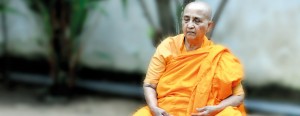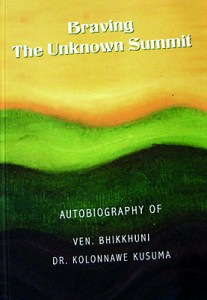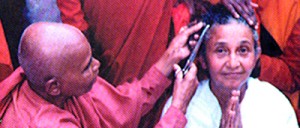Challenging the Brahministic male chauvinism
View(s):
The Bhikkhuni at her daughter’s residence in Wellawatte. Pic by Susantha Liyanawatte
Saranath, India, 1996. Hundreds of devotees, monks, nuns and photographers follow a grand procession of dancers, drummers, horses and caparisoned elephants towards the ordination platform. Kusuma Devendra (nee Gunawardene), about to undergo higher ordination, thinks back to the days of the Buddha, when Ven. Maha Prajapathi Gothami Devi and other women had only their determination to end their Samsaric journeys by entering the Buddha Sasana.
The ceremony started at 6 a.m. and went on until 6 p.m. Her family was there and some of her expatriate classmates had even flown in from London to witness this historic moment. All the nuns (ten including her) had to worship the Buddha prostrating themselves with their foreheads touching the ground. This procedure was repeated more than a hundred times until their knees bled.
Once the long ordination ceremony was done, she became one of the first Sri Lankan women to have been ordained as a bhikkhuni in several centuries.
“Tears came to my eyes when I realised that I had achieved something I must have aspired for, for eons in Samsara. To receive ordination as the first Bhikkhuni after nearly thousand years since the disappearance of Sri Lankan Bhikkhunis! It was unbelievable! Amazing! Even today after 17 years it remains a beautiful dream come true!” Bhikkhuni Kusuma writes in her recently released autobiography ‘Braving the Unknown Summit’. The book, she says, was not intended to be a work of scholarship but a simple narrative to provide, if at all, some guidance and inspiration to women who seek an alternative lifestyle away from hearth and home.
Now spending her golden years as an 83-year-old, at the Ayya Khema Meditation Centre she built, she reflects on her life and her decision to write the book, urged by her chief disciple Ven. Medhavini and daughter Peshala. “So here I am, seated in the open verandah surrounded by Banyan, Bo, Na and Sal trees as well as many trees such as Jak, Coconut, Avocado and Arecanut at my ashram in Olaboduwa, recalling my past. Somewhat to my surprise, I find that the incidents in the past which at that time may have been so difficult and sad to deal with now do not arouse any strong emotional response in my mind. The events that had made deep impressions on me seem to be long dead and gone, and I do not feel any strong likes or dislikes, or anger or sadness. Everything is buried in the sands of time, and I know that all of it will fade away with my death and dissolution. This also seems to be another reason why I should write it down for the benefit of new generations. I know that life is but a temporary “station” or a stop in the infinite life and death process in Samsara. So if my life could be an inspiration to someone, then the writing of it will not be in vain”, she writes.
The book covers her childhood, youth, professional life, marriage, the sad loss of a daughter and son and her turning to Buddhism. She reminisces that becoming a Bhikkhuni was an unprecedented uphill battle. Then again, she had never actually planned to become a Bhikkhuni.
 She was raised in a deeply religious household by nationalist-Buddhist parents of the anti-colonial “Buddhist cultural renaissance”. She grew up learning the Buddhist sutras her grandmother chanted in her native Matara dialect. Her religious life continued, as she became a science teacher, married and had six children. The family observed sil on Vesak and gave regular alms to monks. In the ’70s during the food shortages, she fed and bathed the poor children who flocked to the gates begging for food.
She was raised in a deeply religious household by nationalist-Buddhist parents of the anti-colonial “Buddhist cultural renaissance”. She grew up learning the Buddhist sutras her grandmother chanted in her native Matara dialect. Her religious life continued, as she became a science teacher, married and had six children. The family observed sil on Vesak and gave regular alms to monks. In the ’70s during the food shortages, she fed and bathed the poor children who flocked to the gates begging for food.
Her life changed when, at the Sri Jayewardenepura University studying for a Master’s Degree in Buddhism, she stumbled across the Therigatha, the Psalms of the Buddhist Nuns. The Therigatha “filled her mind with thoughts of enlightenment for women,” especially about the Ten Precept nuns (Dasasil mathas). She secured a small research grants for a doctoral thesis on Dasasil Mathas.
The nuns “strikingly” revealed that neither the monks order nor the government gave them recognition or respect. Dasasil Mathas were a marginalised community in society, their poor living standards obstructing their religious aspirations. Consumed by the subject, she appealed to the President that the government should care for the nuns as much as the monks. She recalls that President J.R. Jayawardene smiled and told her “Madam, I am not going to put my finger into such a controversial thing.”
Nevertheless, he entrusted his wife with the nuns’ matters and finally established a separate section in the Buddha Sasana Ministry for the nuns, which was shut down when it fell under the Monks’ Advisory Board.
Unfazed, she continued her research taking up a subject unknown in Sri Lanka, the bhikkhuni vinaya. At the time, many thought the order of bhikkhunis wouldn’t be revived in Sri Lanka until the advent of the Maithriya Buddha.
The most notable attempt at reviving the bhikkhuni order after its disappearance following the fall of the Anuradhapura kingdom occurred in the early 1900s when Catherine de Alwis, an affluent Catholic woman turned Buddhist, went to Burma and was ordained as Sudarmachari. However, upon her return to Sri Lanka, the male monks here did not recognise her ordination, told her to exchange her brown robes for yellow ones and accepted her only as a ‘Dasasil Matha’, a status not part of the original Sasana fourfold. Though the nuns follow the same ten precepts as the monks, they are not recognised and respected as such.
Bhikkhuni Kusuma quotes Sudarmachari to describe the current situation of nuns: “The Buddha Sasana, like a table rests upon four legs: the bhikku, bhikkhuni, male upasika and female upasik. The bhikkhuni leg is no more, leaving the table shaking and unstable.”

First step:The Dasasil Matha Ordination at the Kelaniya Raja Maha Temple
By this time, she writes in the book that she had renounced house and home and devoted herself to a path of meditation and Dhamma. “Even though I was neither shaven-headed nor wearing robes, I actually lived the life of an ascetic practicing the precepts of a Buddhist Nun in contemplation and piety.”
When she approached Ven. Vipulasara Thera to re-establish the Bhikkhuni order after the Sakyadhitha International Conference in 1993 along with Dr. Hema Gunatilleke and Ranjani de Silva, the move stirred up much controversy. Despite the backlash, about 200 nuns were interviewed for ordination. Nine candidates were chosen and she taught them English prior to their travel to Saranath where Ven. Vipulasara Thera suggested the ceremony be held, Saranath being the place where Lord Buddha had preached His first sermon. She herself travelled to Korea spending three months studying the ordination procedures. It was then that Ven. Vipulasara Thera had called her to announce that he was under attack from all quarters over the reinstatement of the Bhikkhuni order and it could not go through.
She pleaded with the Thera to go ahead regardless. Already a substantial amount had been spent arranging the ceremony in Saranath. The Thera replied, “In that case, there’s only one solution. You are the only person I know committed and qualified enough.” He wanted her to give leadership to the nuns being ordained.
It was a challenge she heard in stunned silence, a decision then made for the “liberation of all womanhood.” She was first ordained as a Dasasil Matha at Kelaniya Raja Maha Viharaya and then along with the nine others ordained a bhikkhuni at Saranath.
Some refused to accept their ordination, claiming it was done according to the Mahayana tradition. Bhikkuni Kusuma responds that it’s a misinterpretation. Historically, Sri Lankan bhikkhunis established the bhikkhuni order in China in 429 CE, and the tradition was preserved in East Asia where it thrived while in Theravada countries it died out. “It’s a matter of getting it back,” Bhikkhuni Kusuma says.
“All this resistance is nothing but monks wanting their supremacy and fear that bhikkhunis would do better,” she adds. “There is brahministic male chauvinism very well apparent in the Sangha but this is no idea of the Buddha.”
Since her ordination, there have been over a thousand Bhikkhunis ordained in the country but still the Bhikkhuni order is not organised.
Bhikkhuni Kusuma says she’s “happier” now focusing on social welfare programmes from her Meditation Centre, instead of pushing for bhikkhuni recognition in Sri Lanka. But she is more than willing to take up the cause internationally, where there is much interest. Since 1996 she has travelled extensively and marvels that 16 years ago when she left hearth and home, she thought “I may well be on the road with no one to care for me”. She writes, “I thought I am too old now to work once I retired from my profession, but here I am, conducting lectures and meditation sessions around the world!”
Her next project, she writes in the book is to establish a hostel for women and nuns in Colombo so that laywomen and nuns who need accommodation would have a place to stay while they complete their work. “I am hoping that with everyone’s help I would be lucky enough to see its completion during my lifetime.”
Follow @timesonlinelk
comments powered by Disqus
























